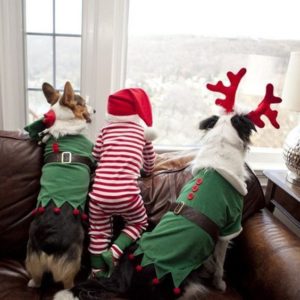How Can We Help?
Holiday Pet Safety Tips P.1
Decorations and Food, Food, Food
Dr. Thomas Edling, DVM, MSpVM, MPH
The holiday season here, and most pet parents will include their critter companions in the merriment. We want to help you make sure that your entire family stays safe as you get ready for the holidays. To start, it is important to try to keep your pet’s routine as close to normal as possible. This means their diet and activity level should stay the same as the rest of the year.
Today’s blog will cover decorations and feasting. Next week we will discuss holiday parties and travelling.
Decorations and House Plants
- Securely anchor your Christmas tree so it won’t fall and consider placing it in a corner of your home if possible. If you have a live tree with a water basin, the water may contain fertilizers or other additives that can cause stomach upset. Don’t add anything to the water, including aspirin, sugar, or fertilizers if you have pets in the house.
- Festive and seasonal house plants as well as live decorations such as mistletoe, holly, lilies and poinsettias can cause serious problems for your pet if ingested. The ASPCA has lists of plants that are toxic to dogs and cats on their website https://www.aspca.org/pet-care/animal-poison-control/toxic-and-non-toxic-plants Potpourris should also be kept away from nosy pets.
- If you have cats in the house, it’s best to decorate with something other than tinsel. Consuming tinsel and other holiday decorations can cause intestinal blockages, sometimes requiring surgery. Breakable ornaments or decorations can also cause injuries to all pets such as lacerations so place them out of harm’s way.
- Candles are often a significant part of holiday décor. If you use candles, don’t leave them unattended when lit and use appropriate candle holders, placed on a solid surface. Try to locate them in areas that your pets can’t reach. In addition, homes with fireplaces should use hearth screens to avoid accidentally burning your pets.
- Electric lights add a warm glow to your holiday season and they can be used safely in your home. If chewed by a pet, electric light cords can cause burns and electrocution. Be sure to supervise your pets when the lights are lit and unplug them from the wall when the lights are off.
- Decorations that are edible or made from edible materials such as dough, cranberry or popcorn strings are enticing to pets. If used, make certain they are out of reach of your pets, high on the tree or mantle
- Gift wrapping is part of the fun! Be sure your pets are well supervised or in another room during this activity. If ingested, wrapping paper, string, bows and ribbons can cause serious medical problems.

Holiday Feasting
- Great food is often the mainstay of the holiday season. You and your family can enjoy your feasts as long as you follow some basic guidelines. Most people know not to feed your pets chocolate. Toxicity is based on the type of chocolate, the amount ingested and the size of your pet, but to avoid all concerns, consider all chocolate dangerous for all pets. Also remember that, xylitol, the artificial sweetener found in some chewing gum, candy and other human treats can be devastating for your dog according to the Center for Veterinary Medicine at the U.S. Food and Drug Administration (FDA). Many foods that are healthy for people, such as grapes, raisins and onions can be dangerous for your pet. During these times when our own diets tend to include extra-rich foods, table scraps such as fatty meats and skin, even turkey, should not be given to your pets as they can cause a serious condition in pets known as pancreatitis. Leave the bones off your pets’ menu too, they can splinter into shards that can cause choking and serious damage to the dog’s mouth, throat, or intestines.
- Yeast dough and Humulus lupulus, commonly known as hops, a plant used in the process of brewing beer can cause serious medical problems for your pets so be careful when baking with yeast dough or brewing your own beer.
- Many holiday festivities include enjoying adult beverages. If your celebration includes them, be sure your pets can’t get to the alcohol. Ingestion of alcohol can cause serious medical conditions in your pet so avoid it all costs.
- Marijuana has become legalized in over 30 states and will more than likely be found at many holiday parties. Since legalization, veterinarians have seen a fourfold increase in the number of animals presenting for accidental ingestion. Because marijuana is now prepared in more edible forms, such as gummy bears and brownies, pets are gaining more exposure. There is no antidote to marijuana, so veterinarians can only provide supportive care until your pet metabolizes the drug. If your pet accidentally ingests marijuana, it is important to tell your veterinarian.
Here’s to the happiest of holidays with your pets!
